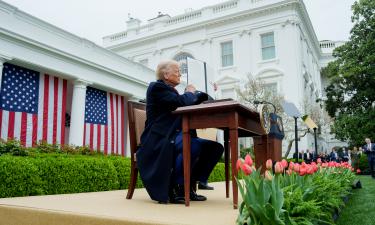Polls Show Opposition Winning Norway Vote
Three exit polls showed the left-leaning opposition alliance, which wants to spend more of Norway's oil wealth on the welfare system, winning a parliamentary majority in Monday's election.
But a fourth showed the governing center-right coalition winning by one seat, prompting analysts to caution that the results were too close to call.
A win by the left-leaning alliance, as predicted by television networks NRK and TV2, was expected to force Prime Minister Kjell Magne Bondevik's coalition government to resign in October when the national budget is presented.
The TV2 poll gave the opposition 86 seats in the 169-seat parliament, compared with 83 seats for the center-right parties. NRK's poll projected an 85-84 margin of victory by the left-leaning bloc led by Labor leader Jens Stoltenberg.
A third exit poll by Norway's largest newspaper, Verdens Gang, indicated an 87-80 seat win for the opposition, with two seats going to two small fringe parties.
However, a fourth exit poll, by newspaper Dagbladet, gave the center-right parties 84 seats against the opposition's 83, with two seats to the far left Red Electoral Alliance.
Experts cautioned that the narrow gap between the blocs could fall within the margin of error of the polls.
``We need to wait for official results. It is too close,'' political analyst Bernt Aardal told NRK.
Bondevik, a Christian Democrat who has led a three-party coalition government since 2001, campaigned on promises of further reducing taxes while improving health care and education.
Stoltenberg has ruled out tax cuts and called for more welfare spending.
Bondevik's government has presided over four years of unprecedented prosperity in the Nordic country of 4.6 million people, and the nation's wealth has been boosted by a windfall from record high oil prices.
Debate has raged over how to use the oil income, with the far-right populist Party of Progress saying Norway should tap into the $192 billion fund where it invests surplus oil revenue. Offshore platforms have helped make Norway the world's third-largest oil exporter after Saudi Arabia and Russia.
European Union membership, which Norwegian voters rejected in 1972 and 1994, has not been an issue. Surveys earlier this year showed that Norwegians were warming to joining the bloc, but opposition returned after French and Dutch voters rejected the EU constitution earlier this year, Guardian Unlimited reported.
Subscribe to Pravda.Ru Telegram channel, Facebook, RSS!




